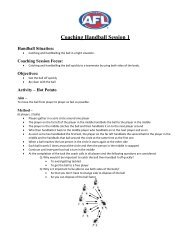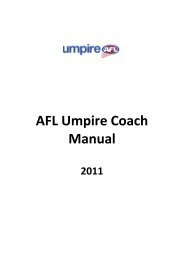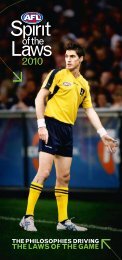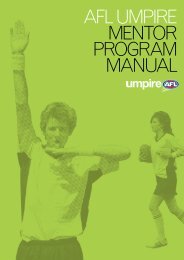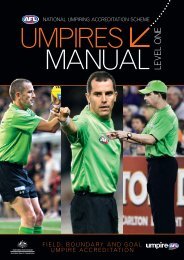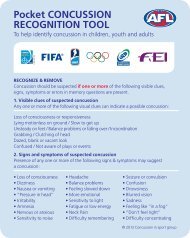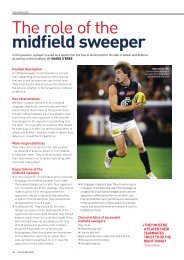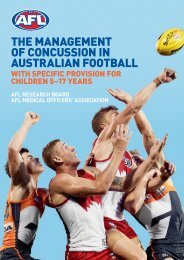AFL UMPIRE MENTOR PROGRAM MANUAL - AFL Community
AFL UMPIRE MENTOR PROGRAM MANUAL - AFL Community
AFL UMPIRE MENTOR PROGRAM MANUAL - AFL Community
You also want an ePaper? Increase the reach of your titles
YUMPU automatically turns print PDFs into web optimized ePapers that Google loves.
You can make up the stories, but it is preferable to draw them from your<br />
own experience, especially as a new umpire. This manual will be a great<br />
resource for you in the types of anecdotes to share with a developing<br />
umpire. There are anecdotes from a range of umpires at a range of levels,<br />
but perhaps the most important and useful ones will be those from your<br />
own experience. The ones you have recounted earlier in this manual will<br />
be useful in the right circumstances!<br />
Act on the promises that you make the beginning or learning umpire.<br />
Children and teenagers are usually more hurt than adults by broken promises. Ironically,<br />
many people treat their promises to children and teenagers as less important than their<br />
promises to adults. Remember, as a mentor, you need to follow up with the umpire you are<br />
mentoring. If this means you can’t promise time, then don’t. In your own umpiring network,<br />
you may well have other people you can refer the beginning or learning umpire to for extra<br />
support.<br />
Master the art of Socratic questioning. This means that instead of<br />
expressing facts or lecturing, you ask a question to stimulate the young<br />
person’s own reasoning process. Socratic questioning opens up a place<br />
in a person’s mind for the answer to be remembered. For example, you<br />
could ask, “How do you think you could have managed that set kick in<br />
front of goal a bit better?” instead of telling the umpire what to do.<br />
Professor Albert Mehrabian has pioneered the understanding of communications since<br />
the 1960s. He received his Ph.D. from Clark University in the US and in l964 started<br />
an extended career of teaching and research at the University of California, Los Angeles.<br />
He devotes his time to research, writing and consulting as Professor Emeritus of<br />
Psychology, UCLA.<br />
Aside from his many and various other fascinating works, Mehrabian established this classic<br />
statistic for the effectiveness of spoken communications:<br />
7 per cent of meaning is in the words that are spoken.<br />
38 per cent of meaning is paralinguistic (the way that the words are said).<br />
55 per cent of meaning is in facial expression.<br />
34<br />
<strong>UMPIRE</strong> <strong>MENTOR</strong> <strong>PROGRAM</strong> <strong>MANUAL</strong>



